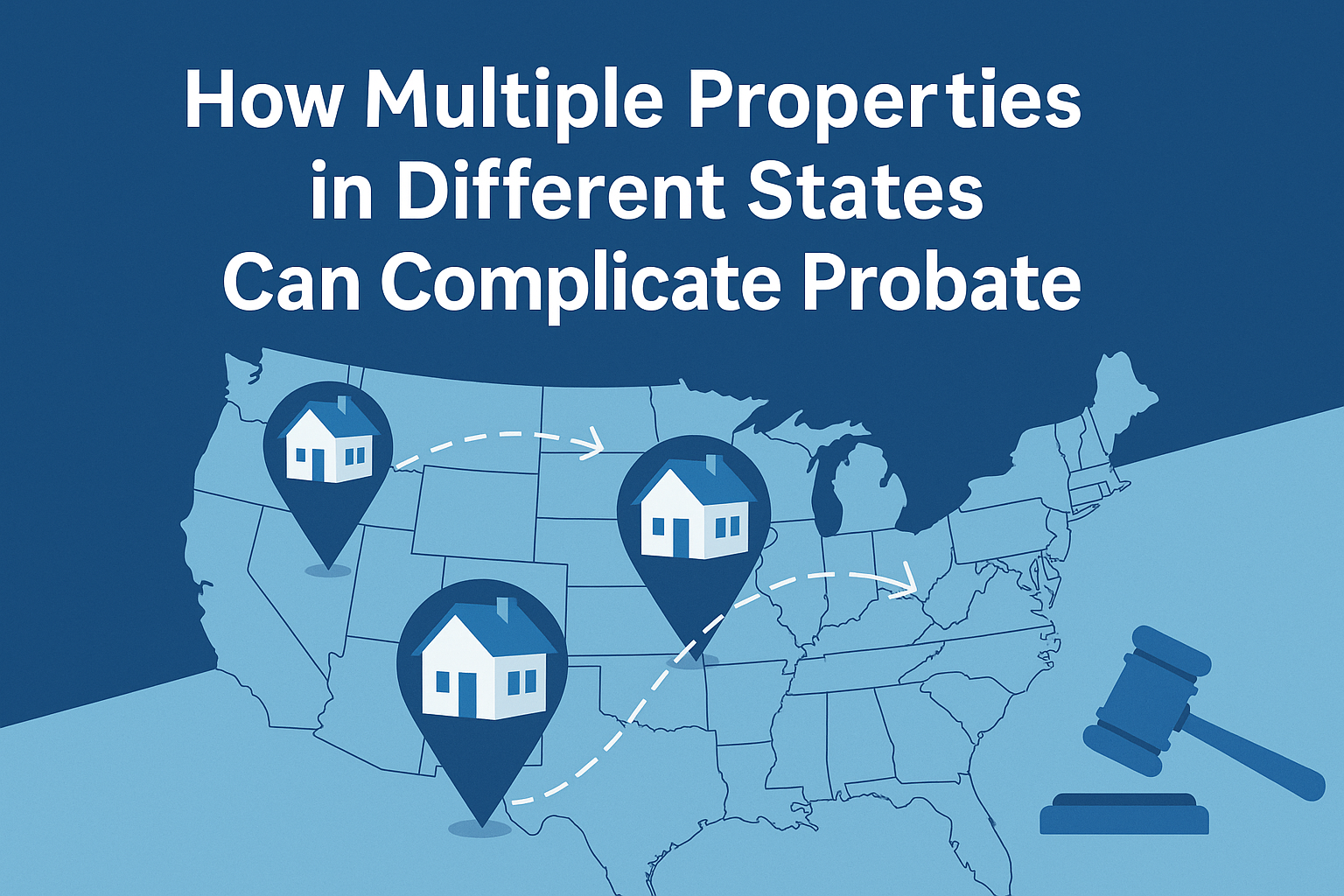What every family needs to know when a loved one leaves behind real estate across state lines.
Losing a loved one is never easy. On top of the grief, there’s often a mountain of paperwork, legal steps, and property-related decisions to navigate. And when that loved one owned multiple properties—especially in different states—the probate process can quickly become more complicated than most families expect.
If you’re an executor, family member, or heir facing this situation, take a deep breath. You’re not alone—and there are ways to make this process smoother. Here’s what you need to know.
Why Location Matters in Probate
Probate is the legal process of settling someone’s estate after they pass away. When real estate is involved, the location of each property plays a critical role.
Each state has its own probate laws. That means if your loved one owned a vacation home in Florida, a rental in Arizona, and their primary residence in Illinois, you’re not just dealing with one probate process—you may be facing multiple probates in different courts. This is known as “ancillary probate.”
What Is Ancillary Probate?
Ancillary probate is a secondary probate proceeding that takes place in a different state from the one where the main probate case (called the “domiciliary probate”) is being handled.
Here’s a simple example:
- Your father lived in Illinois and that’s where his will is filed.
- He also owned a condo in Florida and a cabin in Wisconsin.
- You’ll start probate in Illinois—but you’ll also need to open ancillary probate cases in both Florida and Wisconsin to legally transfer or sell those properties.
Each of these states may have different requirements, timelines, and fees.
Common Complications When Multiple Properties Are Involved
- Increased Costs
More courts = more court fees, legal filings, and potentially more attorneys. It can get expensive quickly, especially if you’re hiring separate legal help in each state. - Longer Timelines
You’re now working with multiple court systems, each with their own pace. While one state might move quickly, another could take months—or longer—especially if there’s a backlog or missing documents. - More Legal Complexity
Not all states treat out-of-state wills the same way. Some may require additional proof of validity or even a different format of documentation. - Tax Differences
Property tax laws vary by state. Some states have estate or inheritance taxes that others don’t, which could affect what’s owed and how it’s distributed. - Logistical Headaches
Traveling to multiple states, managing vacant homes remotely, coordinating cleanouts, handling utilities, and overseeing repairs across state lines can feel overwhelming—especially if you’re doing it all while grieving.
Ways to Simplify the Process
While it may not be possible to avoid ancillary probate entirely once someone passes, there are ways to make it less painful:
✅ Work with a Probate-Savvy Real Estate Agent
Find someone who understands the ins and outs of probate and can coordinate with other agents or attorneys across states. They can help get properties cleaned out, secured, evaluated, and sold faster.
✅ Hire Local Probate Attorneys
Each state may require an attorney licensed there. Choose attorneys who specialize in probate and can coordinate with one another to keep the process moving smoothly.
✅ Collect All Documentation Early
Gather property deeds, mortgage info, tax records, utility accounts, and insurance policies for every property. Having everything in one place saves time and reduces stress later.
✅ Secure and Maintain Each Property
Make sure each home is insured (some policies don’t cover vacant properties), the utilities are managed, and the lawn is maintained. A neglected property can quickly become a liability.
✅ Consider Trust Planning for the Future
If you’re reading this and still have time to plan your own estate—or help a loved one do so—know that placing properties in a living trust can help skip the probate process altogether. It’s worth a conversation with an estate attorney.
It’s easy to feel overwhelmed when probate stretches across state lines, especially when you’re still processing a loss. But with the right support team and a little organization, it can be managed.
And remember—you don’t have to do it alone. If you’re facing probate and need help navigating the real estate side of things, I’m here to guide you with compassion and clarity. Whether it’s coordinating with out-of-state professionals, managing vacant properties, or helping you prepare a home for sale, I’ve helped many families through this—and I’m ready to help yours too.
Need help managing probate real estate in multiple states?
Reach out today for a free consultation, and let’s put a plan in place.

